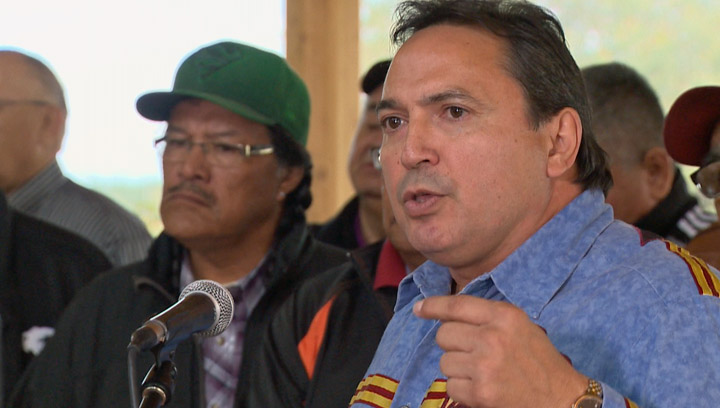WINNIPEG – The new national chief of the Assembly of First Nations says it will no longer be business as usual when it comes to development on First Nations land.

In a fiery speech to assembly delegates in Winnipeg on Wednesday, Saskatchewan’s Perry Bellegarde singled out pipelines and energy development as one of the frontlines in his battle to put First Nations on equal footing with the rest of Canada.
“To the people across this great land, I say to you, that the values of fairness and tolerance which Canada exports to the world, are a lie when it comes to our people,” Bellegarde said.
“Canada will no longer develop pipelines, no longer develop transmission lines or any infrastructure on our lands as business as usual.
“That is not on.”
He pledged opposition to any project that deprives First Nations a share of the profits.
“We will no longer accept poverty and hopelessness while resource companies and governments grow fat off our lands and territories and resources,” he said.
“If our lands and resources are to be developed, it will be done only with our fair share of the royalties, with our ownership of the resources and jobs for our people. It will be done on our terms and our timeline.”
His final remarks drew one of the loudest responses from the crowd.
- Life in the forest: How Stanley Park’s longest resident survived a changing landscape
- ‘Love at first sight’: Snow leopard at Toronto Zoo pregnant for 1st time
- Carbon rebate labelling in bank deposits fuelling confusion, minister says
- Buzz kill? Gen Z less interested in coffee than older Canadians, survey shows
“Canada is Indian land,” he said. “This is my truth and this is the truth of our peoples.”
Bellegarde took 63 per cent of the 464 first-ballot votes cast, more than the 60 per cent required for victory.
Ghislain Picard, the assembly’s interim leader, finished second. Leon Jourdain, chief of the Lac La Croix First Nation in Ontario, finished third.
Bellegarde, who is chief of the Federation of Saskatchewan Indian Nations, ran a campaign that focused on a pledge to restore pride among First Nations and focus on self-determination.
He told reporters the assembly under his leadership will “be respectful, it’s going to be responsive and it’s going to be relevant to First Nations people.”
“I believe it’s a strong mandate and I’m humbled.”
Bellegarde will have an extra six months added to his three-year term as the organization restructures amid questions about its relevance.
Many argue the assembly should wean itself off federal funding, while others have argued it doesn’t reflect the views and concerns of grassroots people.
The AFN’s top job came open earlier this year when former national chief Shawn Atleo resigned due to fallout from his support of a controversial federal act to reform First Nations education.
Ken Coates, senior fellow with the Macdonald-Laurier Institute, followed the election campaign. He said opinion among First Nations is split between those who want to negotiate more rights for aboriginals and those who say treaties don’t need to be rewritten, but properly enforced.
Bellegarde represents the latter, he said.
“He’s more outspoken,” Coates said. “He’s more likely to say dramatic things.”
Bellegarde has a difficult job ahead, he said.
For the first year at least, the national chief will have to focus on reshaping and redefining the organization, Coates said. The political landscape for aboriginal rights has changed so quickly the assembly has to catch up.
The Idle No More movement that saw nationwide protests was as much a rejection of aboriginal leadership as it was of the federal government, he suggested.
“The status quo is not acceptable. It’s obvious people want to go in a different direction.”



Comments